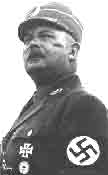Ernst Röhm (original) (raw)

Throughout the period of Hitler's rise to power, Ernst Röhm represented the militant wing of the Nazi Party as the chief organizer of the party militia known as the S.A. (Sturmabteilung) or the Brownshirts.
Wounded three times in World War I, he later was one of the original founders of the Nazi Party. In the 1920s, he helped Hitler secure the support of the army in Bavaria and was later imprisoned for his role in Hitler's failed 1923 Beer Hall putsch.
Throughout his years of service to the Nazi cause, Röhm remains dog-loyal to his master. Röhm's Nazi zeal lead him to advocate that the Nazi seizure of power should culminate in the SA absorbing if not replacing the Reichswehr as the new German army, nazified from the ground up.
After Hitler wins power in January 1933, he becomes increasingly alarmed by Röhm who is now demanding that his multi-million man militia be placed on an equal footing with the Nazi Party. Hitler, the German Army High Command, and Röhm's arch-rival, SS leader Heinrich Himmler, now see Röhm and his SA as a common threat.
In the early morning hours of June 30, 1934, SS forces, accompanied by SS commander Sepp Dietrich and followed by Hitler himself, burst into a country inn near Munich where Röhm and his SA staff had gathered together for a general conference. Röhm and his staff are literally dragged out of their beds and thrown into prison where Röhm and the entire SA command are summarily executed. The German people and the rest of the world are then told that Hitler has foiled a plot by Röhm and his SA sympathizers to seize power and subvert the Nazi revolution.
The Night of the Long Knives as the June 30th massacre came to be called is the Nazi regime's baptism of fire. It secures for Hitler the German Army's gratitude and unquestioning loyalty thereafter. It also translates into a big power gain for Himmler and the SS who now represent the new armed wing of the Nazi Party with the SA neutralized and absorbed into its ranks.
On the same day that Röhm and his SA staffers are massacred, Nazi assassins seize the opportunity to pay two discreet visits to the homes of the two highest ranking officers in the German Army - General (and former Weimar Chancellor) Kurt von Schleicher and General Kurt von Bredow. Schleicher and Bredow happened to be anti-Nazi in their beliefs and strongly opposed to Hitler's plans to nazify the German Army. In both cases, a knock on the door is followed by a hail of bullets that kills Schleicher and Bredow.
The German conspirators who attempted to overthrow Hitler and the Nazi regime from 1938 to 1944 never forgot the June 30th massacre. Many held it up as proof that Hitler would stop at nothing to achieve his demonic ends and could only be removed in the same manner.
Sources: Joric Center